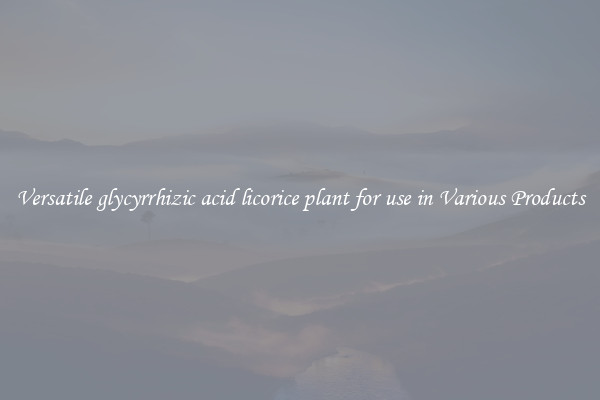Versatile glycyrrhizic acid licorice plant for use in Various Products
Glycyrrhizic acid, commonly found in licorice plants, is a powerful compound that has been used for centuries in various traditional medicines. The licorice plant (Glycyrrhiza glabra) is a versatile herb that has a wide range of uses and benefits. From its roots to its leaves, every part of the licorice plant is valuable for different purposes.

One of the most well-known uses of licorice plants is in the production of candies and sweets. The distinct sweet flavor of licorice is due to the presence of glycyrrhizic acid, which is about 50 times sweeter than sucrose. Licorice candy is popular worldwide, and the use of glycyrrhizic acid gives it a unique taste that many people enjoy.
Aside from its sweet taste, glycyrrhizic acid also has numerous health benefits. It is known for its anti-inflammatory properties, making it a common ingredient in skincare products. Licorice extract is used in creams, lotions, and serums to reduce redness, soothe irritations, and even out skin tone. It is also used in treatments for eczema, psoriasis, and other skin conditions.
In addition to skincare, glycyrrhizic acid is also used in traditional medicine for its medicinal properties. It has been used to treat coughs, colds, and sore throats, as well as digestive issues like indigestion and bloating. Licorice root tea is a popular remedy for these ailments, and its anti-inflammatory properties make it effective in reducing pain and inflammation throughout the body.
Moreover, licorice plants are also used in the food and beverage industry. The roots of the licorice plant are used to flavor foods and drinks, such as teas, beers, and liqueurs. The distinct flavor of licorice adds a unique twist to these products, making them stand out in the market.
Overall, glycyrrhizic acid from licorice plants is a versatile and valuable compound that has a wide range of uses. From candies and skincare products to traditional medicines and beverages, licorice plants play a significant role in various industries. With its sweet taste and numerous health benefits, it's no wonder why the licorice plant has been cherished for centuries.

View details

View details

View details

View details








